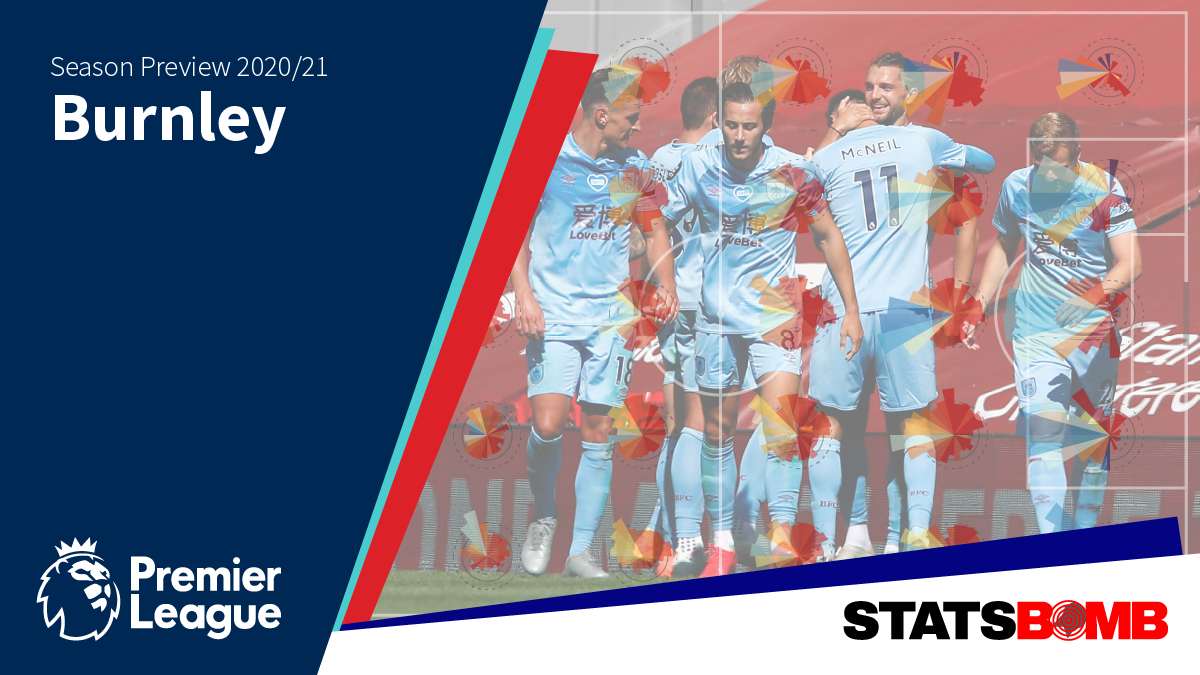Few managers last as long as Sean Dyche.
Closing in on eight years in the Burnley hotseat, the relegation of Eddie Howe and Bournemouth means that he is the longest serving manager in the division. This will be Burnley’s fifth consecutive season in the Premier League and their run to a tenth placed finish in 2019-20 was almost entirely unheralded. The seventh placed finish of 2017-18 clearly took the narrative gust out of this similarly impressive season. This time round they scored exactly the same amount of points (54) but actually won more games (15 to 14). They also did a good job of bouncing back from the lesser season in the middle by chipping a whopping 18 goals from their against total (50 down from 68).
After a run of 4 defeats around New Year, they lost just twice in sixteen games; firstly a 5-0 thumping from Man City, which is the kind of thing that can happen to anyone, and lastly a final day defeat to Brighton. Seven other games against top half teams yielded two wins, and five draws. In the main they were tough to beat in the extended back half of the season. Did the metrics like them too?
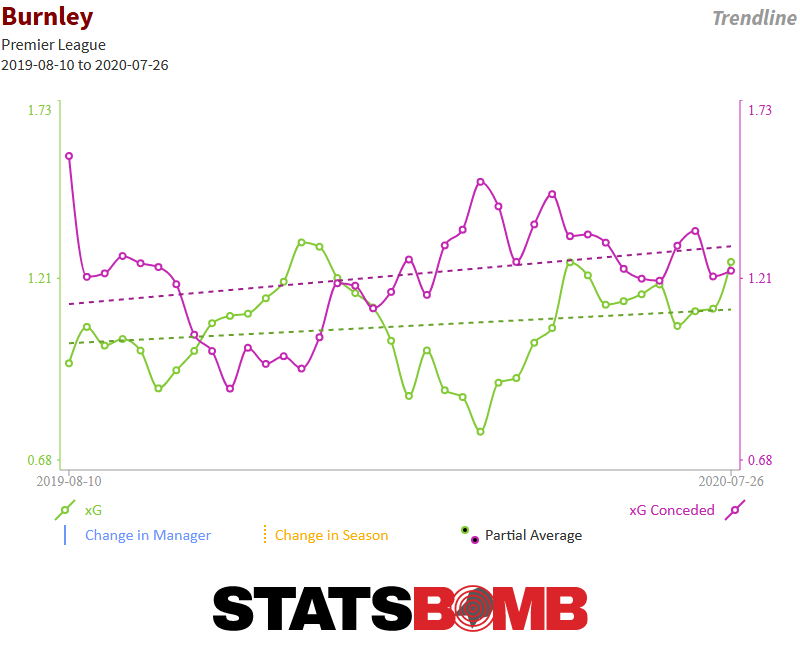
Well, yes and no?
For long swathes of the season, Burnley’s xG conceded exceeded that which they gained. This isn’t unusual though--it’s been the same in all their last four seasons--but in the aggregate, this was the best of the four seasons since promotion and it scoped out only a shade under par (-0.08xG per game). We can see how they cut out the bad games in comparison to 2018-19 if we look at their expected goals value by game here:
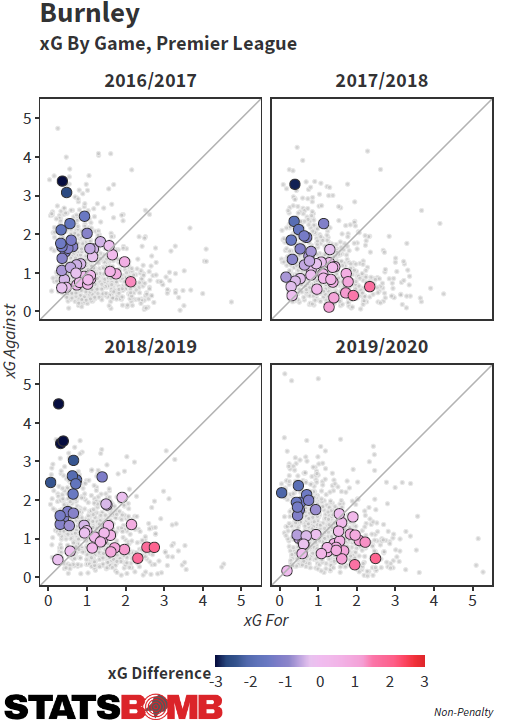
Average metrics, average league position, but a far from average method of getting the job done. Burnley remain unique and flagbearers for their specific and effective style of play. There are a few simple principles that persist season to season:
1. Don't get sent off
Burnley have received three red cards in four seasons. That equates to around once every 50 games. It is a lower rate than any other team that has been in the league during that period. They receive a medium to high volume of yellow cards, but scarcely leave the pitch with less than eleven men.
2. Don't worry about giving up shots
Conceptually, giving up shots is a bad idea. If your opponent doesn't shoot, they can't often score. Burnley don't care so much about that, because although they always give up a ton of shots, the average value of these shots is frequently among the league's lowest and therefore best:
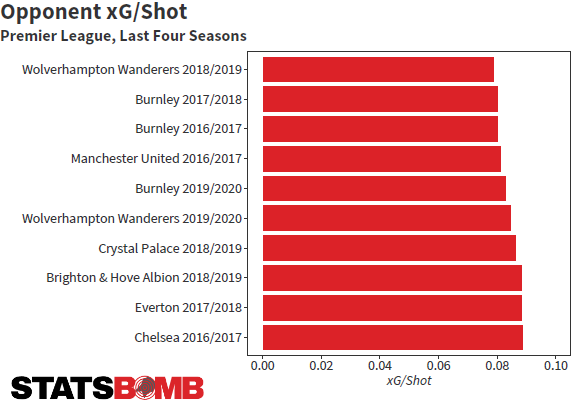
The two good seasons Burnley have had recently--2017-18 and 2019-20--have seen them give up around 14 to 15 shots per game. Their lesser seasons--2016-17 and 2018-19 have seen this at a higher level closer to 17 or 18. However, when measured, thanks in some part to the defensive positioning we have in our model, we can see that the quality of those shots is still in the main low. During 2019-20 they had more defenders behind the ball than any other team and more defenders within a cone that defines the route to goal. Filter down to just inside the box and this still holds. What other impact could stationing more players between the shooter and the goal have?
3. An army of defenders can block shots
Guess what? Burnley consistently block a higher proportion of opponent shots than the rest of the league:
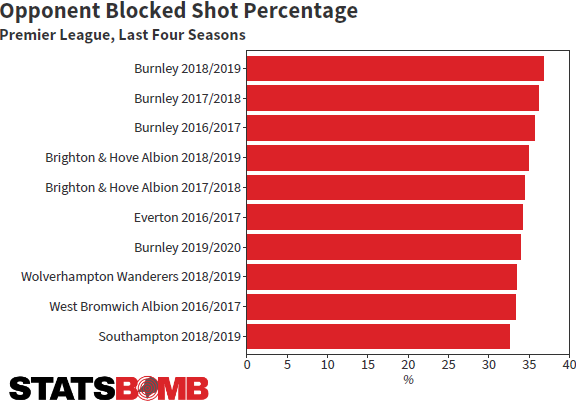
The argument between tactical choice and necessity can rage on elsewhere, but this is what Burnley do in their own box.
What do they do at the other end?
4. Bombard the box
Burnley take a lot of shots from close in. A bunch of these are headers (they rank highly there too as a percentage of all shots) and a bunch of these are set pieces, inswinging corners and the like. But at least in some regard, they get it. Burnley get that scoring is easier the closer you are to goal. This chart is filtered to 10 yards, but you can move that line around and the message is still the same:
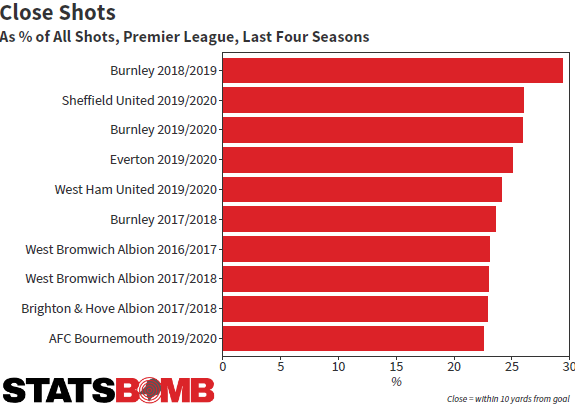
5. Thou shalt not dribble
...unless you're Dwight McNeil. Overall Burnley rank 20th/20 for each of the last four seasons for dribbles attempted and completed. There is some logic here when factored alongside the other stylistic tics. For example, if you're trying to beat an opponent, you may fail to do so and give the ball away in a bad position and your defence maybe caught short. Best if this doesn't happen at all?
NcNeil's two successful dribbles per 90 ranks 41st in the Premier League for players with over 900 minutes. So it is not as if he is wantonly skipping past opposing right backs at will but he is the one player empowered to do so. Jeff Hendrick was the only other player recording more than one per 90 last season, and he now plays for another team.
McNeil is an outlier for other reasons too. There are very few out and out left footed left wingers in the league these days. Indeed, Leroy Sané's departure to Bayern Munich shears the most prominent example of such a player away and even he may end up playing on the right. Left footed wingers tend to get inverted these days. McNeil is also, by a large margin, the only young player in Burnley's squad to have seen any significant game time in any of the last four seasons and he's only been getting significant minutes the last two.
6. If you can't grow a full beard, you're too young, unless you're Dwight McNeil
Full beard or not, at 20 years old, McNeil is a full four years younger than the next youngest first teamer in the squad, January signing from Bristol City, Josh Brownhill.
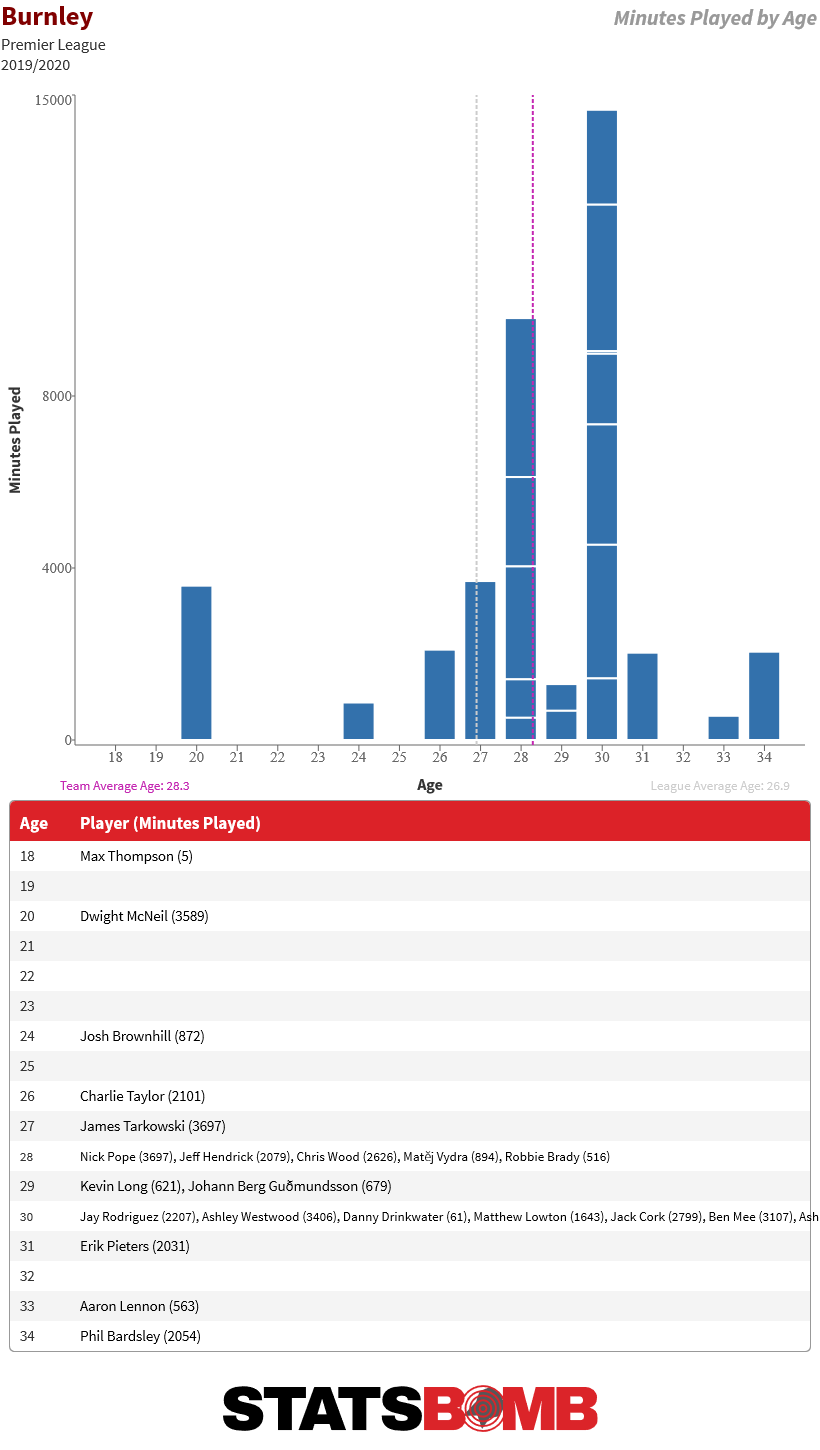
Right now, this team isn't too old. But it's not far from a situation where too many of the squad are over 30. One can hope that the Brownhill signing is a clear recognition of this issue, but with the club quiet so far in this summer transfer window, there is precious little evidence to see what extra remedial work they're going to do.
7. You better be able to play 90 minutes
Sean Dyche isn't going to be voting for five substitutes any time soon. Pre-lockdown, Burnley averaged the fewest substitutions in the league at a solid two per game. Given free reign to run amok and make five substitutions amid a heavy schedule and summer temperatures, Dyche did nothing of the sort and made fewer substitutions. There are interesting angles that have been thrown up since the idea of five substitutes became reality. Do too many substitutions interrupt team cohesion? Can the mysterious momentum be halted by too many personnel changes? Regardless of the truth here, Burnley do it their way and are unlikely to change.
8. We will press you but only where we want to
Burnley's 2019-20 pass-to-press chart was probably the most intriguing of any team in the division. When held up against their previous seasons, we can see that it's actually a subtle but fairly long term trend:
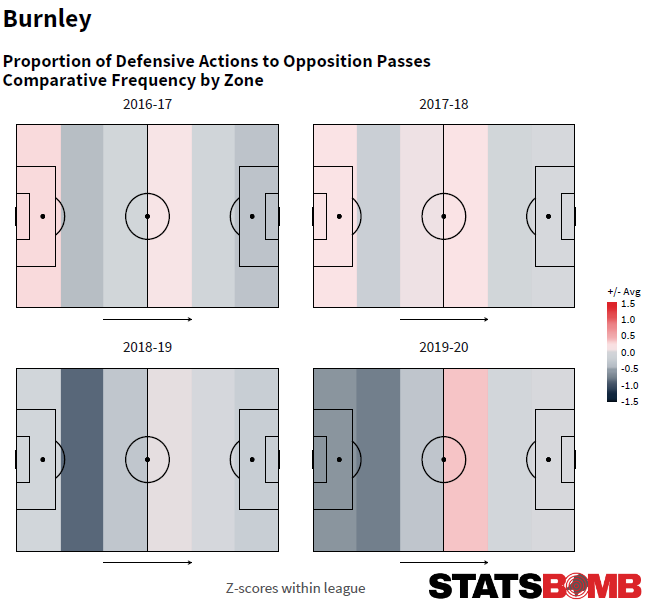
Ahead of the half way line, Burnley will press opponents on the ball. In the rest of the pitch far less so. Our aggression metric, which measures how many opponent ball receipts are pressed within two seconds ranks Burnley in 19th position. And we can see both very high up the pitch and in defensive areas, Burnley will sit off. However, they record a higher percentage of their pressure events in the opposition half than any other teams bar Liverpool and Manchester City, and they are not idle with it, as the 77% of counter pressures (within five seconds of an opposition turnover) they record also ranks highly, fourth. This is a team that deploys specific and differing strategies towards the opposition depending where they are on the pitch.
Projection
While I appreciate that not every team can have a positive profile and point upwards this season, it appears to me that Sporting Index's opening points projection for Burnley is on the low side at around 40. Outside of a legitimately horrific run of metrics in the first half of 2018-19, for the last three seasons, Burnley have shown themselves to be a fairly comfortable mid-table Premier League side. There are warnings to be heeded around the squad aging, and perhaps the squad size, but with Dyche apparently set to stay on--after some off season rumours that his time at the club was coming to an end--the club appears as set as it ever is to confound the naysayers and persist within the league. Whenever the day comes that Dyche does leave, the job of following him will no doubt be extremely difficult and that moment could well be a crux point for the team's retained Premier League status, but we're not there yet, and as such, Burnley in 2020-21 should be entirely fine.
If you're a club, media or gambling entity and want to know more about what StatsBomb can do for you, please contact us at Sales@StatsBomb.com
We also provide education in this area, so if this taste of football analytics sparked interest, check out our Introduction to Football Analytics course
Follow us on twitter in English and Spanish and also on LinkedIn
